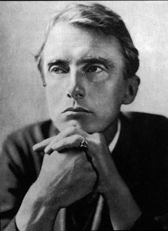Edward Thomas (1878–1917)
Biography
Edward (Philip) Thomas was born in Lambeth, London, of Welsh descent and he was educated at St Paul's college and then Lincoln College at Oxford University (where he studied history). A prolific writer of prose (including biographies of Richard Jefferies, Swinburne, and Keats), and a moderately successful journalist, he began writing poetry in 1912 under the pseudonym Edward Eastaway) but did not devote himself fully to the medium until 1913 after a meeting with Robert Frost, the American poet, who by then was living in England.
Thomas enlisted in 1915 with the Artists' Rifles as a private but was killed two years later at Arras having achieved the rank of 2nd Lieutenant. His poems include some of the most noted pieces from the genre, capturing the love of the English countryside unlike any other.
Biography by: Dr. Stuart Lee, 1997
A Private
This ploughman dead in battle slept out of doors
Many's a frozen night, and merrily
Answered staid drinkers, good bedmen, and all bores:
'At Mrs Greenland's Hawthorn Bush,' said he,
'I slept.' None knew which bush. Above the town,
Beyond 'The Drover', a hundred spot the down
In Wiltshire. And where now at last he sleeps
More sound in France - that, too, he secret keeps.
NSI, p. 164
Literary Criticism of 'A Private'
-
A Private (title)
The anonimity of the central character of the poem is established by simply calling the poem 'A Private'. Thomas then is not writing a memorial poem to a certain person, but rather to the multitude of dead. Nevertheless he fills the poem with personal details giving character to the dead soldier. -
'This ploughman' (L.1)
The ploughman is an important figure to Thomas, representing his love for the country and in particular, England (see also the appearance of the ploughman in 'As the Team's Head Brass').Thomas's admiration for the countryside is well-documented, but a couple of examples will serve to illustrate this. In his essay 'England' he praises Izaak Walton's (1593–1683) The Compleat Angler as 'a book that filled me so with a sense of England...I touched the antiquity and sweetness of England - English fields, English people, English poetry, all together' (E. Thomas, The Last Sheaf: Essays (1928), p.109.). In 1915 he compiled an anthology entitled This England in which he claims 'I wished to make a book as full of English character and country as an egg is of meat'.
-
''Many's a frozen night" (L.2)
This mirrors the frozen nights spent in the trenches by the ploughman (and Thomas of course). -
"The Drover" (L.6)
By giving the detail of the pub's name, Thomas adds personality to the dead ploughman. -
''where now...he secret keeps" (L.7 & 8)
The ending is serene, with the long vowels of the rhyming 'sleeps' and 'keeps' adding to the calm. There is no bitterness here as one would find in Sassoon or Owen - the sleep of the ploughman is 'sound' and secret.



